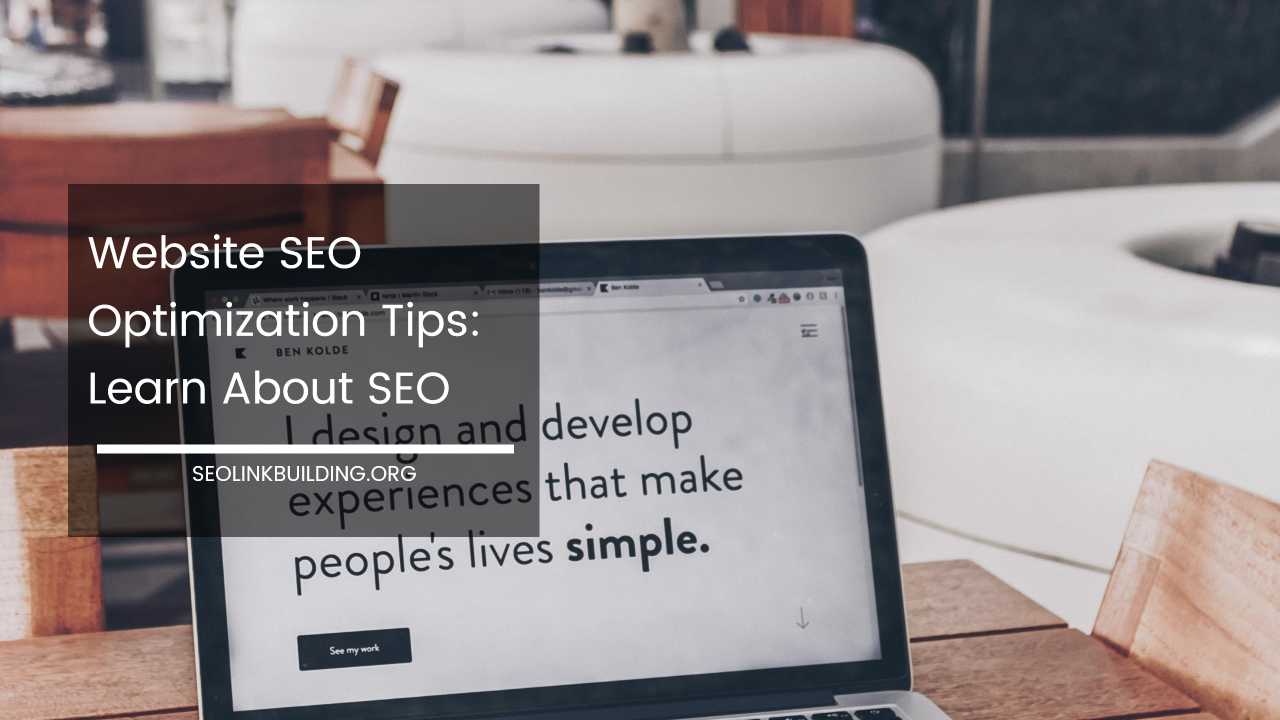Power Up Your Website: Essential SEO Optimization Tips

About SEO
Website SEO Optimization Tips: Learn About SEO and Boost Your Online Presence
In today’s digital landscape, a website is often a business’s primary storefront. But just like a physical store tucked away on a forgotten backstreet, a website with no SEO optimization struggles to attract customers.
SEO, or Search Engine Optimization, is the art and science of improving your website’s visibility in search engine results pages (SERPs).
The higher you rank for relevant keywords, the more organic traffic you’ll attract, and the more likely you are to convert visitors into customers or brand loyalists.
This article dives deep into the world of SEO, providing website owners with actionable tips to optimize their online presence and climb the SERP ladder.
Demystifying SEO: How Search Engines Work
Before we delve into optimization techniques, let’s understand how search engines work. Here’s a simplified breakdown of the three crucial stages:
- Crawling: Search engines use automated programs called crawlers or spiders to scour the internet, discovering new and existing web pages. These crawlers follow links from indexed websites to find fresh content.
- Indexing: Once a webpage is discovered, the crawler analyzes its content and stores it in a massive database called the search engine index. This process allows the search engine to understand the content and context of your website.
- Ranking: When a user enters a search query, the search engine retrieves the most relevant web pages from its index based on a complex algorithm. This algorithm considers hundreds of factors, including keyword relevance, content quality, website structure, and user experience. The goal is to deliver the most helpful and informative results to the user.
SEO Optimization Techniques for Website Success
Understanding the search engine process empowers you to optimize your website for better visibility. Here are some key strategies to consider:
1. Keyword Research: The Foundation of SEO
Keywords are the search terms users type into search engines. Effective SEO starts with thorough keyword research. Identify relevant keywords with high search volume but low competition. Tools like Google Keyword Planner and SEMrush can help you uncover these hidden gems.
Pro Tip: Don’t just stuff your website with high-volume keywords. Focus on long-tail keywords, which are more specific and often have less competition. For example, instead of targeting “running shoes,” target “best running shoes for women with wide feet.”
2. Content is King (and Queen): Creating Compelling and SEO-Friendly Content
High-quality, informative content is the cornerstone of a successful SEO strategy. Search engines favor websites that consistently publish fresh, relevant content that addresses user needs and search queries.
- Focus on value: Write content that solves user problems, answers their questions, and provides valuable insights.
- Optimize for readability: Use clear, concise language, break up long text with subheadings and bullet points, and optimize for mobile viewing.
- Incorporate keywords naturally: While keyword density is important, prioritize natural integration over keyword stuffing.
- Target diverse content formats: Experiment with blog posts, infographics, videos, and other engaging formats to cater to different learning styles.
3. Technical SEO: The Nuts and Bolts of Website Structure
Technical SEO ensures your website is crawlable, indexable, and user-friendly. Here are some crucial aspects to consider:
- Website speed: Optimize page load times for a smooth user experience. Slow loading websites get penalized by search engines.
- Mobile-friendliness: In today’s mobile-first world, a responsive website design that adapts seamlessly to all devices is essential.
- Site structure: Organize your website with a clear and logical structure. Use internal linking to connect relevant pages and ensure crawlers can easily navigate your site.
- Structured data markup: Implement schema markup to provide search engines with additional information about your content, potentially leading to richer search results.
4. On-Page Optimization: Optimizing Individual Website Pages
On-page optimization involves fine-tuning individual web pages to improve their ranking potential for specific keywords. Here are some key elements:
- Title tags and meta descriptions: Craft compelling and informative title tags and meta descriptions that accurately reflect your page content and entice users to click.
- Header tags: Utilize header tags (H1, H2, H3) to structure your content, improve readability, and indicate page hierarchy to search engines.
- Image optimization: Optimize image file sizes and include relevant alt tags for better user experience and search engine understanding.
5. Off-Page Optimization: Building Authority with Backlinks
Off-page SEO focuses on building website authority through backlinks, which are links from other websites pointing back to yours. Search engines view backlinks as a sign of trust and credibility. Here’s how to encourage backlinks:
- Guest blogging: Contribute high-quality guest posts to relevant websites in your niche. Include a link back to your website in your author bio.
-
- Broken link building: Identify broken links on websites in your niche and reach out to the website owners, offering your content as a replacement.
- Social media promotion: Share your content on social media platforms to increase brand awareness and drive traffic back to your website. This can potentially lead to organic backlinks.
6. Local SEO for Brick-and-Mortar Businesses
If you have a physical location, local SEO is crucial for attracting local customers. Here are some key strategies:
- Claim and optimize your Google My Business listing: This free tool allows you to manage your online presence across Google Search and Maps.
- Optimize your website for local keywords: Include your city and state in your website content, title tags, and meta descriptions.
- Encourage positive online reviews: Positive reviews on Google My Business and other platforms build trust and improve local search ranking.
7. Building a Sustainable SEO Strategy
SEO is an ongoing process, not a one-time fix. Here are some tips for building a sustainable SEO strategy:
- Stay updated with SEO trends: Search engine algorithms constantly evolve. Keep yourself informed about the latest SEO best practices to maintain optimal website performance.
- Track your results: Use analytics tools like Google Search Console to monitor your website traffic, track keyword ranking, and identify areas for improvement.
- Focus on user experience: Prioritize creating a positive user experience alongside SEO optimization. Websites that offer value and keep users engaged are more likely to rank higher.
Final Thoughts: Reap the Rewards of Effective SEO
By implementing these website SEO optimization tips, you can significantly improve your website’s visibility in search engine results pages.
Remember, SEO is a marathon, not a sprint. Consistent effort, high-quality content, and a user-centric approach are key to achieving long-term SEO success.
As your website climbs the SERP ladder, you’ll reap the benefits of increased organic traffic, brand awareness, and ultimately, business growth.













